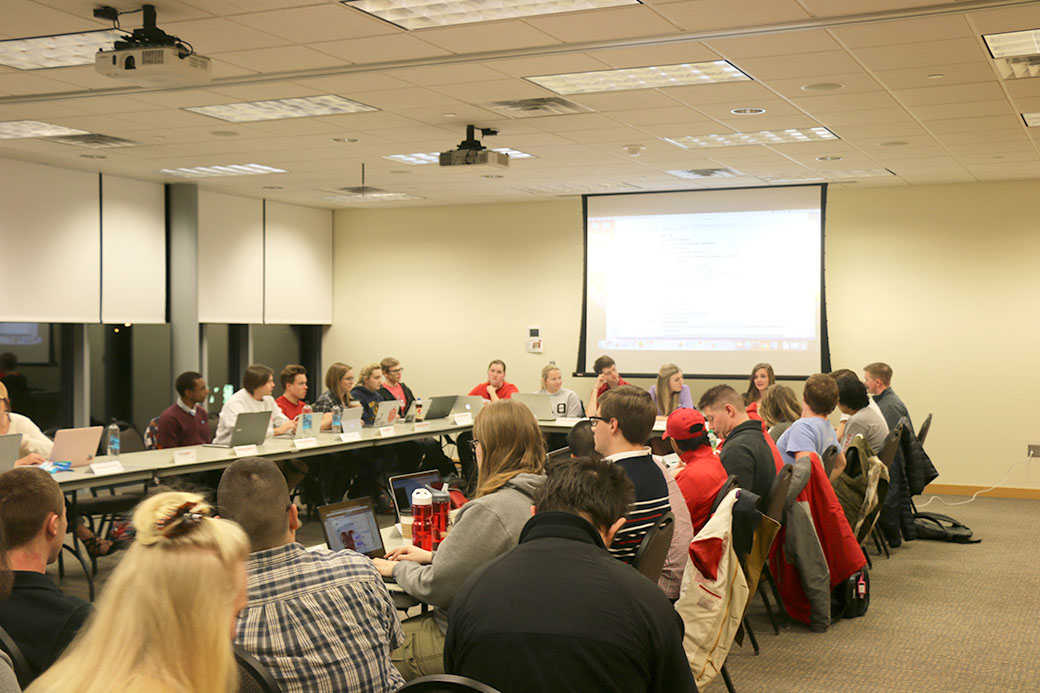
Two SGA debates to take place this year
With the Student Government Association executive elections coming up, in addition to the Cross Media Council Debate, SGA will be co-hosting its own debate with USD’s Speech and Debate team.
The debate will take place on Feb. 27 at 7 p.m. in the Muenster University Center pit lounge. The CMC debate will be in the Al Neuharth Media Center conference room on Feb. 23 at 6 p.m.
SGA Senator Marcus Ireland thinks it’s unusual for a governing body to host its own debate.
“I don’t think any governing body to this day has ever done it,” he said. “Last year, the SGA president wanted to host a second debate and she had it planned and hosted by two different organizations. I think this is highly unethical of us to kind of hold our own (debate) because who’s really in charge? Are the senators trying to bolster someone’s campaign? I think having a second debate is a great idea, but having us do it, as a governing body, is suspicious.”
Ireland suggested the Political Science League as a debate host.
“They’re a great moderator,” he said. “They’re non-partisan political organization. I know there are senators involved in that org, I’m involved. But I remembered last year when they hosted, we abstained.”
While some may argue that it’s irregular and ethically questionable for elected officials to host their own debate, political science professor Matthew Fairholm said that doesn’t really apply here.
“While a governing body doesn’t usually host its own debate, the SGA is a student service organization,” he said. “In fact, if any other student organization hosted it, that would potentially be unethical, because they receive money from SGA.”
Because the old guard in SGA doesn’t have much of a stake in the results of the election, Fairholm said there isn’t any conflict.
Jaine Andrews, managing editor of the Keloland news station of Sioux Falls, questioned whether it’s appropriate to call the debate a ‘debate’ at all.
“It sounds like a town hall meeting, not a debate,” she said. “It shouldn’t be billed as a debate where you’re allowing people to ask questions of the candidates. If you set it up as a town hall, I don’t think there’s an obvious conflict of interest.”
Current SGA President Nathaniel Steinlicht said the debate will likely be a town hall style discussion.
“There’ll be a lot more questions and answers, sitting down with candidates,” he said. “Leaving up a lot to the audience to come up and ask a question.”
If the event is actually a debate in the traditional sense, then objectivity could could be called into question, Andrews said.
“If you are hosting the debate, it might cause people to question your objectivity,” she said. “Because you are selecting who is asking the questions. If you are setting up the format of the debate in terms of how long each candidate gets to answer questions, that could be questionable. The question is, who’s running the debate?”
Steinlicht said the governing body is hosting its own debate so that students will be more able to participate in the event.
“The Cross Media Council debate is good because it livestreams and people can view it afterwards, but it’s in the Neuharth Center,” he said. “We wanted to have a debate in the MUC so we could have a question-answer format and get a lot of passerby students interested in the election.”
Shane Semmler, coach of the Speech and Debate team, said the group was happy to co-host with SGA.
“It was part of a larger discussion among us about how Speech and Debate can be part of campus life more and be present on campus,” Semmler said. “It’s a great idea for us, it’s very unique to what we do – that is debate.”
Presidential candidate Sadie Swier said she and her running mate Lucas Lund are excited to participate in the new debate.
“Any time that students have the opportunity to come to us and come to these SGA forums, then we want to do it,” Swier said.
Josh Anderson, presidential candidate Teagan McNary’s running mate, hopes the second debate will help cover more issues that don’t get addressed in the first.
“I think there are good and true intentions on having another debate to focus on issues,” he said. “Maybe work off things that don’t get mentioned in the first debate and give students another opportunity to be aware of the election.”


